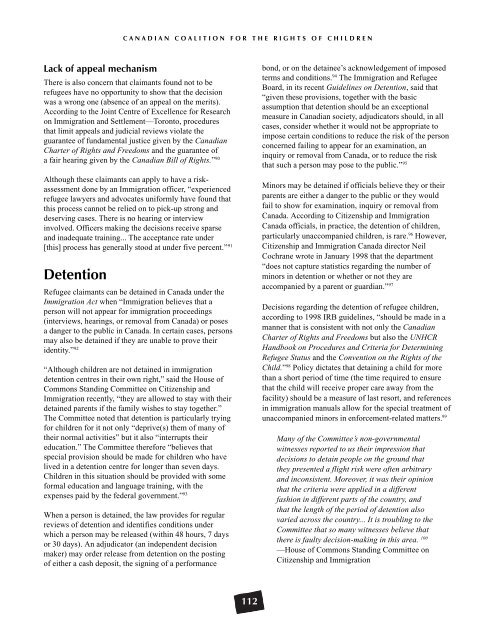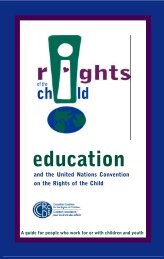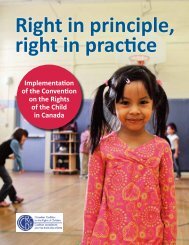Poste - Canadian Coalition for the Rights of Children
Poste - Canadian Coalition for the Rights of Children
Poste - Canadian Coalition for the Rights of Children
You also want an ePaper? Increase the reach of your titles
YUMPU automatically turns print PDFs into web optimized ePapers that Google loves.
Lack <strong>of</strong> appeal mechanism<br />
C A N A D I A N C O A L I T I O N F O R T H E R I G H T S O F C H I L D R E N<br />
There is also concern that claimants found not to be<br />
refugees have no opportunity to show that <strong>the</strong> decision<br />
was a wrong one (absence <strong>of</strong> an appeal on <strong>the</strong> merits).<br />
According to <strong>the</strong> Joint Centre <strong>of</strong> Excellence <strong>for</strong> Research<br />
on Immigration and Settlement—Toronto, procedures<br />
that limit appeals and judicial reviews violate <strong>the</strong><br />
guarantee <strong>of</strong> fundamental justice given by <strong>the</strong> <strong>Canadian</strong><br />
Charter <strong>of</strong> <strong>Rights</strong> and Freedoms and <strong>the</strong> guarantee <strong>of</strong><br />
a fair hearing given by <strong>the</strong> <strong>Canadian</strong> Bill <strong>of</strong> <strong>Rights</strong>.” 90<br />
Although <strong>the</strong>se claimants can apply to have a riskassessment<br />
done by an Immigration <strong>of</strong>ficer, “experienced<br />
refugee lawyers and advocates uni<strong>for</strong>mly have found that<br />
this process cannot be relied on to pick-up strong and<br />
deserving cases. There is no hearing or interview<br />
involved. Officers making <strong>the</strong> decisions receive sparse<br />
and inadequate training... The acceptance rate under<br />
[this] process has generally stood at under five percent.” 91<br />
Detention<br />
Refugee claimants can be detained in Canada under <strong>the</strong><br />
Immigration Act when “Immigration believes that a<br />
person will not appear <strong>for</strong> immigration proceedings<br />
(interviews, hearings, or removal from Canada) or poses<br />
a danger to <strong>the</strong> public in Canada. In certain cases, persons<br />
may also be detained if <strong>the</strong>y are unable to prove <strong>the</strong>ir<br />
identity.” 92<br />
“Although children are not detained in immigration<br />
detention centres in <strong>the</strong>ir own right,” said <strong>the</strong> House <strong>of</strong><br />
Commons Standing Committee on Citizenship and<br />
Immigration recently, “<strong>the</strong>y are allowed to stay with <strong>the</strong>ir<br />
detained parents if <strong>the</strong> family wishes to stay toge<strong>the</strong>r.”<br />
The Committee noted that detention is particularly trying<br />
<strong>for</strong> children <strong>for</strong> it not only “deprive(s) <strong>the</strong>m <strong>of</strong> many <strong>of</strong><br />
<strong>the</strong>ir normal activities” but it also “interrupts <strong>the</strong>ir<br />
education.” The Committee <strong>the</strong>re<strong>for</strong>e “believes that<br />
special provision should be made <strong>for</strong> children who have<br />
lived in a detention centre <strong>for</strong> longer than seven days.<br />
<strong>Children</strong> in this situation should be provided with some<br />
<strong>for</strong>mal education and language training, with <strong>the</strong><br />
expenses paid by <strong>the</strong> federal government.” 93<br />
When a person is detained, <strong>the</strong> law provides <strong>for</strong> regular<br />
reviews <strong>of</strong> detention and identifies conditions under<br />
which a person may be released (within 48 hours, 7 days<br />
or 30 days). An adjudicator (an independent decision<br />
maker) may order release from detention on <strong>the</strong> posting<br />
<strong>of</strong> ei<strong>the</strong>r a cash deposit, <strong>the</strong> signing <strong>of</strong> a per<strong>for</strong>mance<br />
112<br />
bond, or on <strong>the</strong> detainee’s acknowledgement <strong>of</strong> imposed<br />
terms and conditions. 94 The Immigration and Refugee<br />
Board, in its recent Guidelines on Detention, said that<br />
“given <strong>the</strong>se provisions, toge<strong>the</strong>r with <strong>the</strong> basic<br />
assumption that detention should be an exceptional<br />
measure in <strong>Canadian</strong> society, adjudicators should, in all<br />
cases, consider whe<strong>the</strong>r it would not be appropriate to<br />
impose certain conditions to reduce <strong>the</strong> risk <strong>of</strong> <strong>the</strong> person<br />
concerned failing to appear <strong>for</strong> an examination, an<br />
inquiry or removal from Canada, or to reduce <strong>the</strong> risk<br />
that such a person may pose to <strong>the</strong> public.” 95<br />
Minors may be detained if <strong>of</strong>ficials believe <strong>the</strong>y or <strong>the</strong>ir<br />
parents are ei<strong>the</strong>r a danger to <strong>the</strong> public or <strong>the</strong>y would<br />
fail to show <strong>for</strong> examination, inquiry or removal from<br />
Canada. According to Citizenship and Immigration<br />
Canada <strong>of</strong>ficials, in practice, <strong>the</strong> detention <strong>of</strong> children,<br />
particularly unaccompanied children, is rare. 96 However,<br />
Citizenship and Immigration Canada director Neil<br />
Cochrane wrote in January 1998 that <strong>the</strong> department<br />
“does not capture statistics regarding <strong>the</strong> number <strong>of</strong><br />
minors in detention or whe<strong>the</strong>r or not <strong>the</strong>y are<br />
accompanied by a parent or guardian.” 97<br />
Decisions regarding <strong>the</strong> detention <strong>of</strong> refugee children,<br />
according to 1998 IRB guidelines, “should be made in a<br />
manner that is consistent with not only <strong>the</strong> <strong>Canadian</strong><br />
Charter <strong>of</strong> <strong>Rights</strong> and Freedoms but also <strong>the</strong> UNHCR<br />
Handbook on Procedures and Criteria <strong>for</strong> Determining<br />
Refugee Status and <strong>the</strong> Convention on <strong>the</strong> <strong>Rights</strong> <strong>of</strong> <strong>the</strong><br />
Child.” 98 Policy dictates that detaining a child <strong>for</strong> more<br />
than a short period <strong>of</strong> time (<strong>the</strong> time required to ensure<br />
that <strong>the</strong> child will receive proper care away from <strong>the</strong><br />
facility) should be a measure <strong>of</strong> last resort, and references<br />
in immigration manuals allow <strong>for</strong> <strong>the</strong> special treatment <strong>of</strong><br />
unaccompanied minors in en<strong>for</strong>cement-related matters. 99<br />
Many <strong>of</strong> <strong>the</strong> Committee’s non-governmental<br />
witnesses reported to us <strong>the</strong>ir impression that<br />
decisions to detain people on <strong>the</strong> ground that<br />
<strong>the</strong>y presented a flight risk were <strong>of</strong>ten arbitrary<br />
and inconsistent. Moreover, it was <strong>the</strong>ir opinion<br />
that <strong>the</strong> criteria were applied in a different<br />
fashion in different parts <strong>of</strong> <strong>the</strong> country, and<br />
that <strong>the</strong> length <strong>of</strong> <strong>the</strong> period <strong>of</strong> detention also<br />
varied across <strong>the</strong> country... It is troubling to <strong>the</strong><br />
Committee that so many witnesses believe that<br />
<strong>the</strong>re is faulty decision-making in this area. 100<br />
—House <strong>of</strong> Commons Standing Committee on<br />
Citizenship and Immigration




